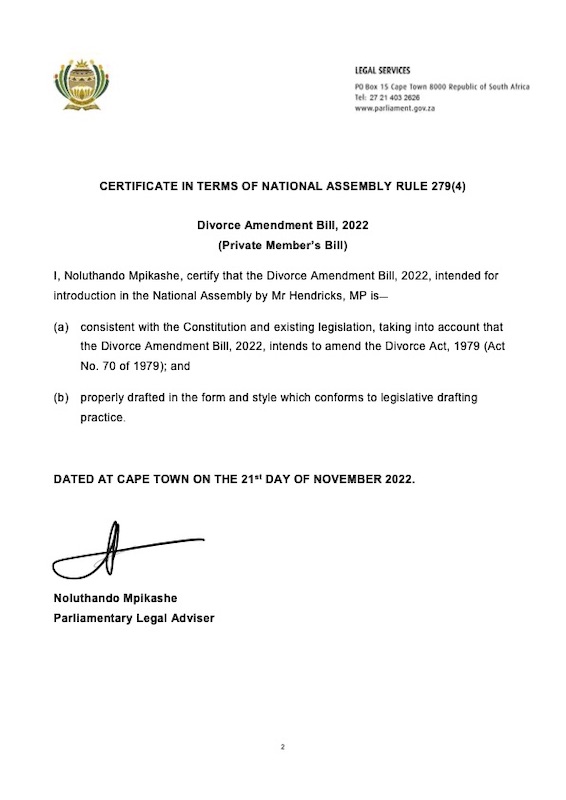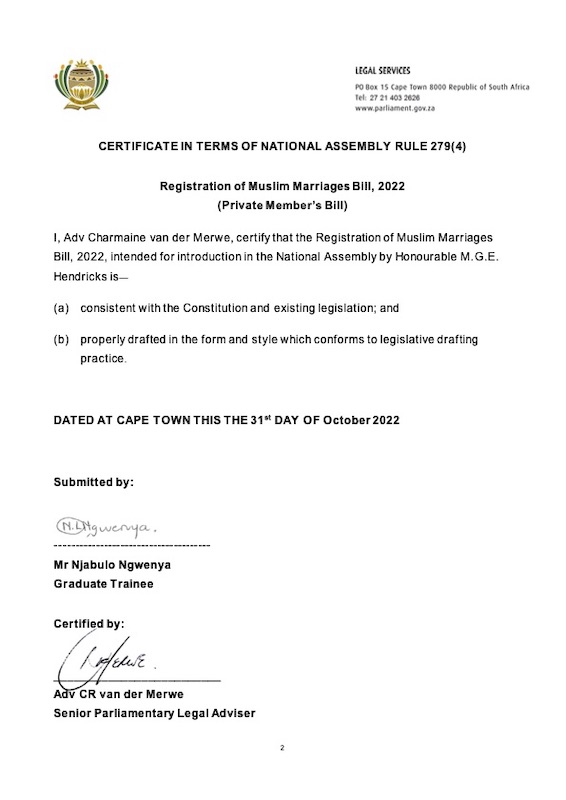THE MUSLIM MARRIAGE BILLS 2022
IT’S OFFICIAL!
Victory for Muslim women
AL JAMA-AH’S AMENDMENTS TO THE DIVORCE MARRIAGE BILL HAVE BEEN APPROVED BY PARLIAMENT.
THIS IS WHAT YOU NEED TO KNOW
AL JAMA-AH’S AMENDMENTS ON DIVORCE BILL APPROVED BY CABINET
AL JAMA-AH’s four amendments to the Divorce Act 1997 have been approved by Cabinet last week. In 2022 the Party submitted two private members bills to Parliament calling for the recognition of Muslim Marriages and for amendments to the Divorce Act which will afford Muslims legal discourse in matters of dispute. The new Draft Marriages Bill will now be open for public comment.
“In June 2022, the Constitutional Court had found that the Divorce Act in its current form to be inconsistent with the Constitution as it excludes Muslim Marriages. The court found that a section of the Divorce Act is unconstitutional in that it unfairly discriminates against child of married parents and those of unmarried parents,” said Minister in The Presidency Khumbudzo Ntshavheni.
Of the five clauses proposed to amend unconstitutional sections of the Divorce Act, the four clauses proposed by Al Jama-ah are:
- Clauses 1 – insertion of a new definition of Muslim marriage recognised by the
Constitutional Court Judgement to be part of South Africa’s common law.
- Clause 2 – amends section 6 of the Divorce Act by providing safeguarding mechanisms for minors or dependants of a Muslim
- Clause 3 – amends section 7 of the Divorce Act by empowering a court to grant a divorce decree on the dissolution of a Muslim marriage to make an order with regard to the redistribution of
- Clause 4 – amends section 9 of the Divorce Act to empower a court when granting a divorce a decree on the dissolution of a Muslim marriage to give an order that patrimonial benefits of a Muslim marriage be forecited in stipulated
The amendments include Al Jama-ah’s proposed definition of a Muslim marriage under Section 1 of the Divorce Amendment bill: “A marriage concluded in accordance with Islamic Law, that is, Shariah, which regulates all public and private behaviour as derived from traditional customs (Al-Urf), the two primary sources, namely, the Quran and Sunnah (Prophetic model) and that uses juristic tools such as ijma (the consensus) of Muslim Jurists and the individual jurist’s qiyas (analogical deductions) to issue legal edicts.”
The proposed amendments will allow Muslim women to access the divorce court which will give them the same benefits and protection as minor and dependent children in civil marriages. Due to the non-recognition of Muslim marriages, many Muslim families have suffered because of the harm South African legal system has caused as regards Muslim marriages; in these, Muslim wives and their children were often left destitute, homeless, and penniless when the spouse (that is, the husband) dies or agrees to a divorce.
Discrimination
Muslim women have for many years face hardships due to the non-recognition of Muslim marriages. The discriminatory clauses not only denied Muslim women their rights as espoused in Islam, but also from the rights women of other faiths enjoy under the current South African civil law and the Constitution of 1996. In many cases women were left helpless as the existing law does not enforce the husband to fulfil his obligations to the wife and children according to Islam. Islam has granted women fundamental rights but due to the patriarchal social system women are being denied their rights.
The current civil law leaves women in cases of divorce impoverished despite their financial contributions to the marriage; they are easily alienated from the benefits of the Intestate Succession Act 81 of 1987 and the Maintenance of Surviving Spouses Act 27 of 1990.
“The non-recognition of Muslim marriages thus permits the persistent alienation of Muslim women from their rights provided for in Islam which impedes on their personhood and dignities,” says adv Fayruz Nagia.
The discrimination against Muslim women and the hardships they endure, were for the first time raised in by a Member of Parliament, Al Jama-ah’s leader Hon Ganief Hendricks. “This was Al Jama-ah’s 2019 Election Manifesto mandate from the Muslim community to pursue for the recognition of Nikah marriages so Muslim women can access the Divorce Court for their rights in terms of Shariah for their share of the estates at time of Talaq or death of a spouse,” says Hendricks.
This new bill will assist the office of the family advocate to assist with the investigation, welfare, and best interest of minor children; the help will be extended to the children born from a Muslim marriage as well as parents will no longer suffer under the inconsistencies and prejudice of the previous Act.
Rights in Shariah
Shariah puts great emphasis on Freedom, Justice, and Rights; however, these have been misunderstood by many despotic regimes in the Muslim world. They imposed certain aspects of Islamic Law and yet ignored many other aspects which made Muslims to only belief that which was propagated by despotic regimes. One cannot speak about Islamic Law or Shariah without referring to the three major issues which are emphasised in Islam, which is freedom, justice, and rights.
“Freedom meaning, not only Muslims but whoever is resident in the place where Islam is ruling, must be free. Freedom of conviction is a prerequisite for being Muslim. The concept of freedom is one of the imperatives in Shariah,” says Shaykh Ramadan Ahmed.
On the question of Justice, he says: “all the citizens of a state must be equal before the law and there is nobody who is above the law, no matter what position they occupy in society. Whatever is Right by nature, the state should fulfil its obligations towards its citizens. These are three major elements without which you can never talk about Islam in the context of the state,” he says.
THE NEW MUSLIM MARRIAGE BILLS
SUPPORTING DOCUMENTS: CERTIFICATES OF COMPLIANCE
CERTIFICATE OF COMPLIANCE:
DIVORCE AMENDMENT BILL

CERTIFICATE OF COMPLIANCE:
REGISTRATION OF MARRIAGE BILL

SUPPORTING DOCUMENTS: PARLIAMENTARY MEMORADUMS
DRAFT BILLS
ON THE THRESHOLD!
MUSLIM MARRIAGES TO BE RECOGNISED AS VALID IN SA
DOWNLOAD MAINTENANCE
AMENDMENT BILL
APRIL 2023: PARLIAMENTARY BRIEFING
REGISTRATION OF MUSLIM MARRIAGE BILL
DRAFT : RECOGNITION OF RELIGIOUS MARRIAGES BILL
To make provision for the recognition of religious marriages
1. Definitions
In this Act unless context otherwise indicates, ‘court’ means a High Court of South Africa or a court for the Regional Division as provided for in section 29(1)(b) of the Magistartes court Act 1944; ‘religion’ means any of the following religions but not limited thereto – Islam, Christianity, Hinduism, Judaism, Bhuddism;‘marriage officer’ is an officer appointed for the purposes of registration of marriages as contemplated in the Marriages Act 25 of 1961;
2. Application
(1) The provisions of this Act shall apply to any religious marriage concluded after the commencement of the act where the parties to the marriage elect, in their contract of marriage, to be bound by the provisions of this Act.
(2) This Act shall apply to all religious marriages concluded before the commencement of the Act, unless the parties, within a period of 36 months or such longer period as may be prescribed, as from the date of the commencement of the Act, jointly elect, in the prescribed manner, not to elect to be bound by the provisions of this Act, in which event the provisions of this Act shall not apply to such marriage.
3. Recognition of Religious Marriages
(1) All religious marriages concluded under the prescripts of any religion are given full force and are recognized in South African Law.
(2) The consequences of all religious marriages are also recognized as they relate to,
i. maintenance;
ii. custody and access;
iii. proprietary consequences of a marriage and divorce.
iv. The law governing the termination of marriages under the religious system.
4. Voluntary Mediation and Arbitration
(1) The parties to any religious marriage may in their contract elect to mediate all disputes that may arise during the subsistence of such marriage or on termination of that marriage to a mediator to be agreed between them.
(2) The parties may furthermore in their contract of marriage agree that if the mediation fails they will refer such dispute to an arbitrator agreed to between them to resolve their dispute.
(3) An arbitrator arbitrating a dispute under this Act shall have the power to arbitrate any dispute including disputes relating to the validity of the marriage, termination thereof, the proprietary consequences of a divorce, maintenance, custody and access.
(4) To the extent necessary the provisions of this Act amend the Arbitration Act 42 of 1965.
(5) The arbitration award issued by the arbitrator shall be final and binding.
5. Review of Arbitration Awards by Private Arbitrators
(1) A party dissatisfied with the ruling of an arbitrator made in terms of this Act shall have the right to apply within 6 weeks of the date of the ruling to a court for an order reviewing and setting aside such arbitration award only on the following grounds :
(i) Misconduct
(ii) Fraud
(iii) Excess of power
(iv) Gross irregularity
(2) For the purposes of this Act a gross irregularity shall not include a review for reasonableness.
6. Compulsory Mediation and Arbitration
(1) In the event that the parties do not elect to mediate their disputes or arbitrate their disputes by way of private mediation and arbitration in terms of the previous section, then the following shall apply.
(2) In the event of any dispute arising during the subsistence or otherwise or the termination of a religious marriage, prior to instituting legal proceedings, the parties must refer the dispute for mediation to a prescribed and accredited mediation council.
(3) The mediation council must attempt to resolve the dispute by means of mediation within a period of 30 days from the date of the referral thereof and the parties may each be represented at the mediation proceedings by a representative of their choice.
(4) The mediation council must upon resolution of the dispute, submit the mediation agreement to court, within 45 days and the court, must if satisfied, confirm the mediation agreement unless there is evidence that it is not binding under the religious system recognized by the parties.
(5) In the event that a mediation fails, either party may have recourse to a court. The court hearing the matter may, if it is expedient to do so, direct that the parties resolve the dispute through arbitration and may for that purpose appoint an arbitrator to arbitrate such dispute in the event that the parties are not in agreement to that arbitrator’s identity.
(6) Any arbitrator appointed by the court to arbitrate that dispute must be qualified to resolve that dispute under the laws applicable to the religious system.
7. Amendment of Laws
The Acts specified in the Schedule are hereby amended to the extent set out in the third column of the Schedule.
8. Short title and commencement
This Act is called Recognition of Religious Marriages Act 20…. And comes into operation on a date fixed by the President by proclamation in the Gazette.
SCHEDULE
The following Act is amended :
Arbitration Act 42 of 1965 Amendment of Section 2(a) by the introduction of the words “unless the arbitration is concluded under the Recognition of Religious Marriages Act” after the word ‘or any cause’ in subsection (a) so that the section reads “reference to arbitration shall not be permissible in respect of :
(a) any matrimonial cause or any matter incidental to such cause unless such arbitration is conducted in terms of the Recognition of Religious Marriages Act…”

